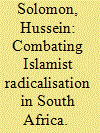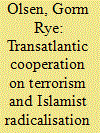| Srl | Item |
| 1 |
ID:
129500


|
|
|
|
|
| Publication |
2014.
|
| Summary/Abstract |
Is radical Islamism spreading in South Africa? The answer has to be an emphatic 'yes'. When discussing issues of radicalisation in Africa, commentators often examine the case of Somalia's al-Shabaab or al-Qaeda's North African franchise, al-Qaeda in the Islamic Maghreb (AQIM). Very little attention is paid to radicalisation amongst South Africa's Muslim population. Yet, there is growing evidence that South Africa has come to play an important role in global jihadi networks, from the provision of safehouses and identity documents to the movement of funds and the existence of paramilitary camps for local and foreign jihadis. This paper aims to briefly examine radicalisation and its attendant sources in the country, as well as seeking ways to combat it utilising lessons learned from other countries. 'Institutional socialisation' by means of the sources of radicalisation, as well as the concept of what could be termed 'the democratisation of jihad' are discussed. The author also proposes ways to combat radicalisation in South Africa utilising lessons learned from other countries, concluding that issues of radicalisation and deradicalisation have to be dealt with on the part of both government and the South African Muslim community.
|
|
|
|
|
|
|
|
|
|
|
|
|
|
|
|
| 2 |
ID:
158112


|
|
|
|
|
| Summary/Abstract |
Transatlantic cooperation on security has a long history. In Africa, transatlantic cooperation on security is basically between France and the United States. This paper asks why the two former competitors in Africa started to cooperate and also why they are so willing to engage militarily. The central argument in this paper poses that France and the US cooperate because it is indispensable to both parties. To France, the cooperation is indispensable because the US is the only power with sufficient financial means and with sufficient air-lift capacity to transport French and African troops into conflict-ridden countries. To Washington, cooperation with Paris is indispensable because the French authorities have unique access to intelligence and knowledge about large parts of Africa. By applying a foreign policy analysis framework, the paper analyses how perceptions of decision-makers, the role of personality and leadership, the role of government institutions and political systems have impacted the relevant decisions. It is emphasised that the two different decision-making systems – the French “state dominated” and the American “society dominated” – produce the same result, namely collaboration. It suggests that the perception of a serious threat from terrorism and Islamist radicalisation overrules differences in decision-making systems.
|
|
|
|
|
|
|
|
|
|
|
|
|
|
|
|